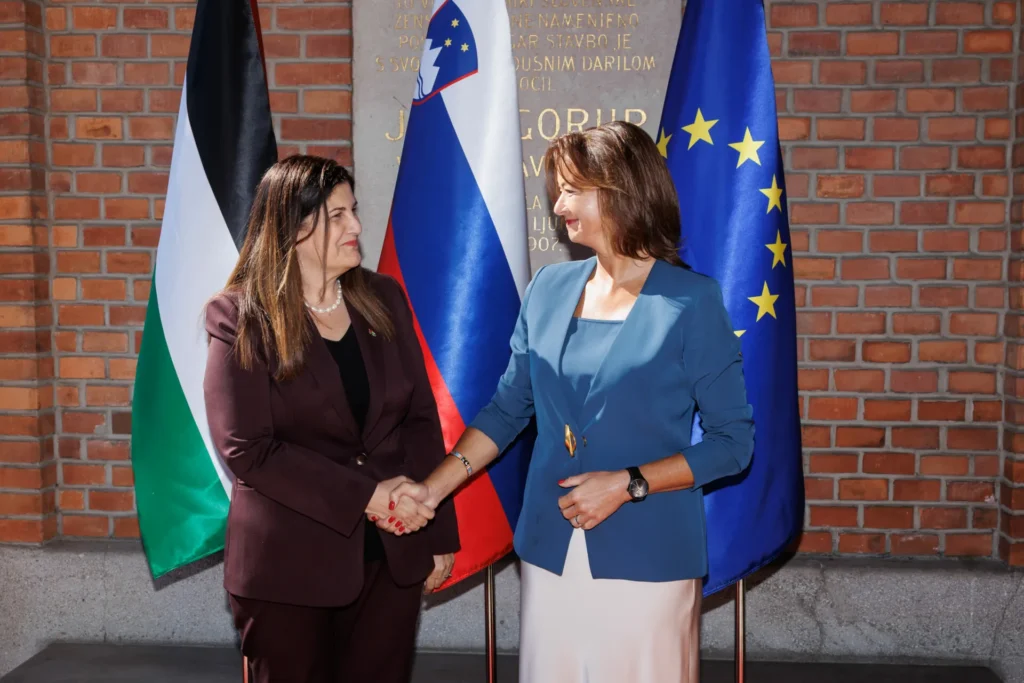“This is a continuation of activist politics that does not contribute to resolving the situation in the Middle East, as Slovenia is taking a one-sided stance in favour of the Palestinians,” said Tone Kajzer, an expert on international relations and former Slovenian ambassador to Washington, commenting on the visit of Palestinian Foreign Minister Varsen Aghabekian Shahin to Slovenia.
At the invitation of Foreign Minister Tanja Fajon, Palestinian Foreign Minister Varsen Ahabekian Shahin is currently visiting Slovenia. During her visit, she is expected to meet with the entire political leadership, including President of the Republic Nataša Pirc Musar, Prime Minister Robert Golob, and Speaker of the National Assembly Urška Klakočar Zupančič.
According to the Slovenian Press Agency (STA), the purpose of the Palestinian minister’s visit is to deepen cooperation and bilateral relations between the two countries, which were officially established in June last year after Slovenia’s recognition of Palestine.
Varsen Aghabekian Shahin exchanged views with the Slovenian foreign minister on current international issues, with particular focus on the current situation in the Middle East. A memorandum of understanding on the development of relations between the two countries was also signed. This will establish a formal framework for regular dialogue and concrete cooperation.
This, however, is not Minister Aghabekian Shahin’s first visit to Slovenia. She last visited Slovenia last weekend, when she and Foreign Minister Fajon attended the closing event of the Sit Down campaign – the premiere of the musical Child of Peace at the Križanke stage as part of the Ljubljana Festival.
The visit by the Palestinian Foreign Minister comes after the current government decided to impose an embargo on arms trade and economic sanctions against Israel. The University of Ljubljana followed suit and adopted a series of politically charged resolutions, distancing itself from Israeli academic institutions and calling for a freeze on cooperation for European research and development projects. Slovenia is considered one of the most vocal advocates of Palestinian rights within the European Union, as it never misses an opportunity to join in the criticism of Israel, often forgetting the very nature of the conflict and condemning the actions of the terrorist group Hamas, which triggered the escalation of the conflict with its bloody attack.
We asked veteran diplomat Tone Kajzer to comment on the visit in question. In his words, it is clear from afar that this is a continuation of activist politics that does not contribute to resolving the situation in the Middle East, as Slovenia is taking a one-sided stance in favour of the Palestinians. “I wonder who this lady represents, because we know who has de facto power in Gaza and what is happening there.”
“One could say that this is a continuation of this internal PR, bringing this conflict into the Slovenian public sphere,” he pointed out, adding that it is clear that this is polarising the Slovenian public, which, in his opinion, is not a good thing. “We are not resolving the situation there, but at the same time, we are destabilising Slovenia. I strongly oppose such foreign policies,” he said clearly. Because this creates instability, it would be necessary to ask politicians, such as the opposition, how they view this. However, this is part of a broader European and Western problem, the creation of toxic empathy, as Professor Dr Žiga Turk wrote in a recent article.
Regarding the visit, which Kajzer sees as a continuation of PR, we may ask what kind of cooperation they have in mind, because there is no substance to it. “This is a continuation of the policy that began when this government took office and then became very radical with the recognition of Palestine. Now they are simply continuing it,” he said with regret, adding that this will further distance Slovenia from the possibility of pursuing a credible foreign policy. “These are very sophisticated times, because we can see what is happening – a very strong geopolitical storm. Unfortunately, with these activities, we are not working for the good of Slovenia.”
Ž. N.


